-
5 major banks offer mortgage relief in fire-ravaged L.A. areas, Newsom says - about 1 hour ago
-
How to Watch Texans vs Chiefs: Live Stream NFL Divisional Playoffs, TV Channel, Prediction - 4 hours ago
-
What Border Crisis? Mexican Migrant Shelters Are Quiet Ahead of Trump - 7 hours ago
-
Southern California in ‘uncharted territory’ as fire weather returns all next week - 8 hours ago
-
New Trump Meme Comes With a Legal Waiver - 9 hours ago
-
Mexican Mafia leader offered protection to El Chapo, prosecutors say - 14 hours ago
-
H-E-B Food Recalls: Full List of Products Impacted - 14 hours ago
-
Explosions Heard in Ukraine’s Capital - 18 hours ago
-
TikTok Says App May Be ‘Forced to Go Dark’ In New Update - 20 hours ago
-
‘This has been really devastating’: Inside the lives of incarcerated firefighters battling the L.A. wildfires - 21 hours ago
Oakwood celebration is a homecoming for a displaced Black community
Venice’s Black community gathered at Oakwood Park last week for an event with all the trappings of a typical Juneteenth celebration; soul music, crisp outfits, fried chicken, cornbread and a bounce house for the kids.
But Juneteenth is just what they’ve been calling the observance in recent years, since President Biden declared it a national holiday in 2021. For more than two decades, Oakwood’s Black residents have celebrated the third Saturday in June under names such as Hood Day, Neighborhood Day, Community Day and Remembrance Day.
Some residents said the holiday marks the day Black people first settled in the Oakwood area of Venice, an occasion that was first celebrated more than 100 years ago. Whatever the name, it’s a time for the community to remember loved ones lost too soon and renew treasured relationships.
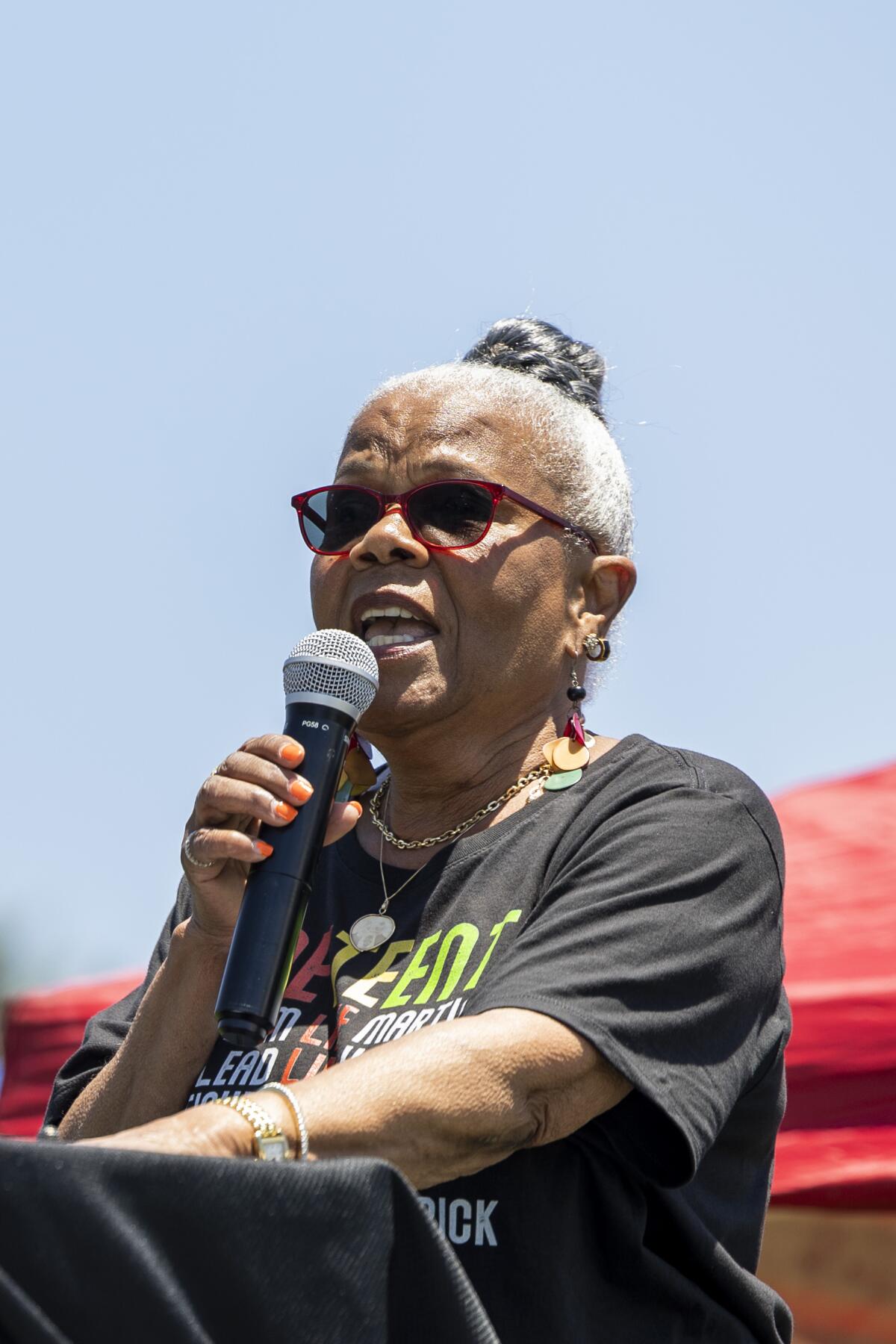
Naomi Nightingale speaks at the Juneteenth celebration in Venice.
(Zoe Cranfill / Los Angeles Times)
“These kinds of gatherings have been going on in this park since I was a little girl in the 1960s,” said Naomi Nightingale, a Venice native, professor and historian.
The word that came to my mind was homecoming. Everyone knew each other well enough to ask after each other’s cousins, mothers and siblings by name. It seemed no one could finish a conversation before they were interrupted by new loved ones to greet.
But most of the people I spoke with no longer lived in the area and could only point to the homes that they grew up in. Nightingale estimates just a third of the attendees still have Venice ZIP Codes, and most of them are renters. Hood Day has never been about protest, but over the last couple of years, as gentrification pushed more of Oakwood’s residents out of the neighborhood, the political dimensions of the celebration have become harder to ignore.
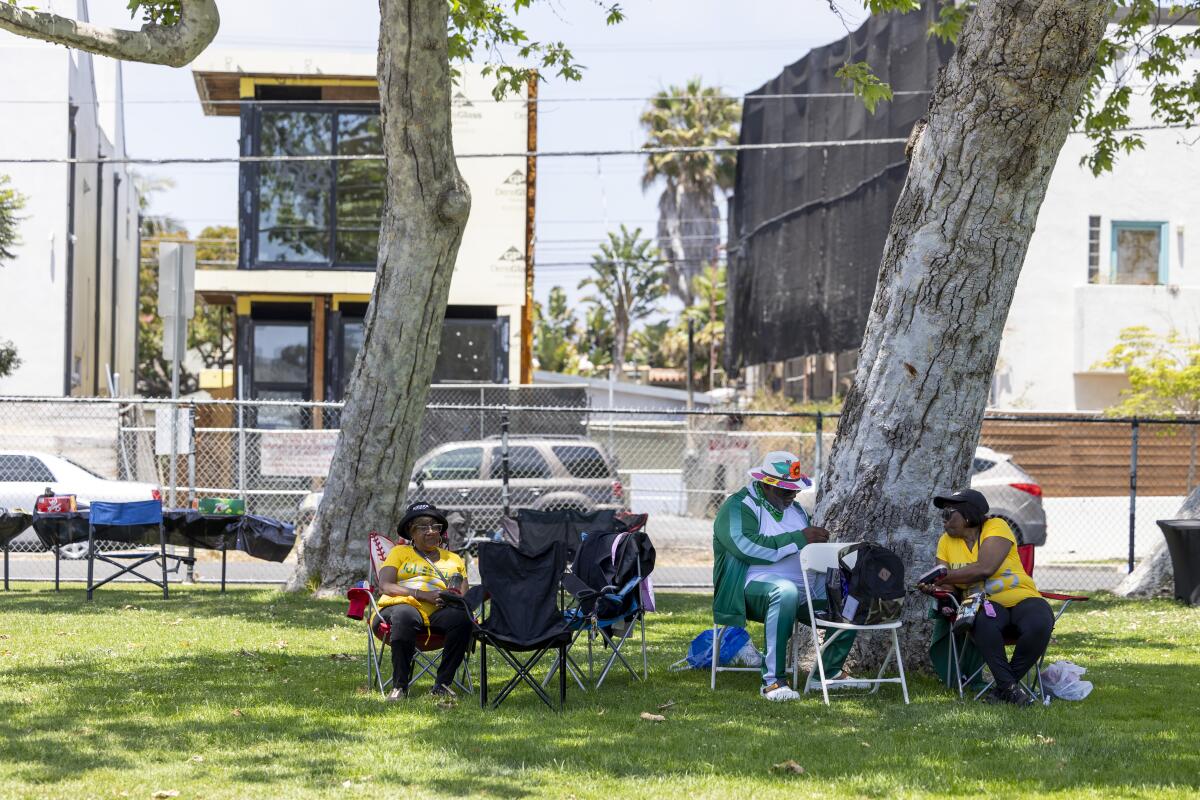
A family relaxes at the Oakwood Juneteenth celebration in Venice. Behind them are new houses being built in a neighborhood that has seen much gentrification.
(Zoe Cranfill / Los Angeles Times)
“We’re not going to stop trying to preserve the sacrifices that our grandparents made in this community,” said Nightingale, who says she gets at least one call every day from a Realtor trying to buy her house.
There’s “protest and resistance” in trying to keep the community alive, Nightingale said. Bringing Oakwood back to life every year is their way of honoring the sacrifices their ancestors made to live in Venice, she said.
Gwen Moseley, 60, remembers the neighborhood as the kind of communal place where kids who stepped out of line might be punished by any of the area’s moms, who all worked together to parent, she said.
“They say it takes a village, and we were a village for sure,” said Moseley, who now lives in the Mid-City area.
Like most of the people I spoke with, she pointed out the home where she used to live. It sits on a street where a house is currently listed on Redfin for $5.3 million. Her dad owned the family home in Venice, but when he passed away, her brother inherited the property and decided to sell rather than deal with managing it.
She has some regrets about that, but at least they have Hood Day, she said. Here she can watch the babies she once bounced on her knee grow into towering college graduates, maintain old friendships and stay a part of the old neighborhood.
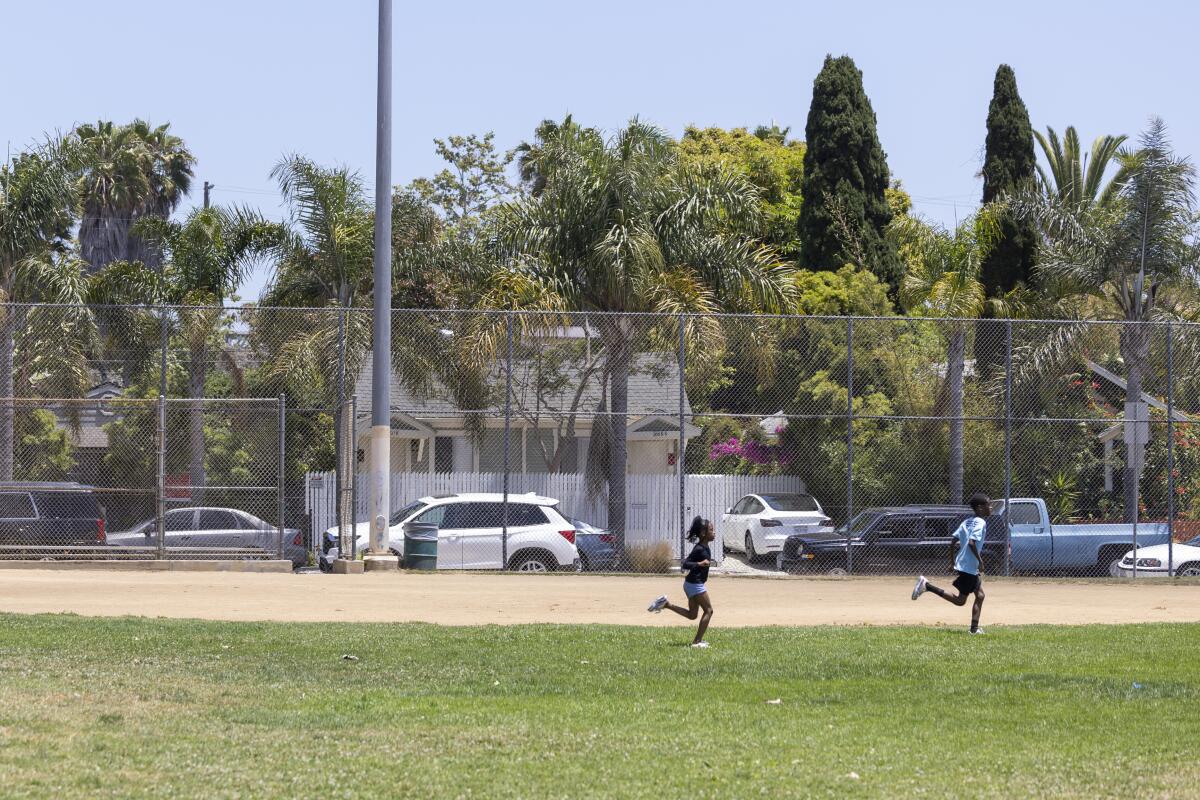
The Oakwood Juneteenth celebration.
(Zoe Cranfill / Los Angeles Times)
“We look forward to this day right here. Now we call it Juneteenth, but we’ve been doing this way before Juneteenth came along. It’s the only time we all get to see each other, besides a funeral,” Moseley said.
Geraldine Holloway, 67, said all of her best memories and loved ones are in Oakwood. She recalled the excitement among the neighborhood kids when McDonald’s first opened up on Lincoln Boulevard. The memory of her mother throwing away the Big Mac she and her siblings pooled their money for still makes her laugh.
The neighborhood really started to change about seven years ago, she said. Her family always rented in Venice, and she spent a few years in Palmdale and other parts of Los Angeles, but there was never any place like Oakwood. She moved back to the neighborhood to be near her grandkids.
“I never leave. I mean, I left, but I always come back,” Holloway said.
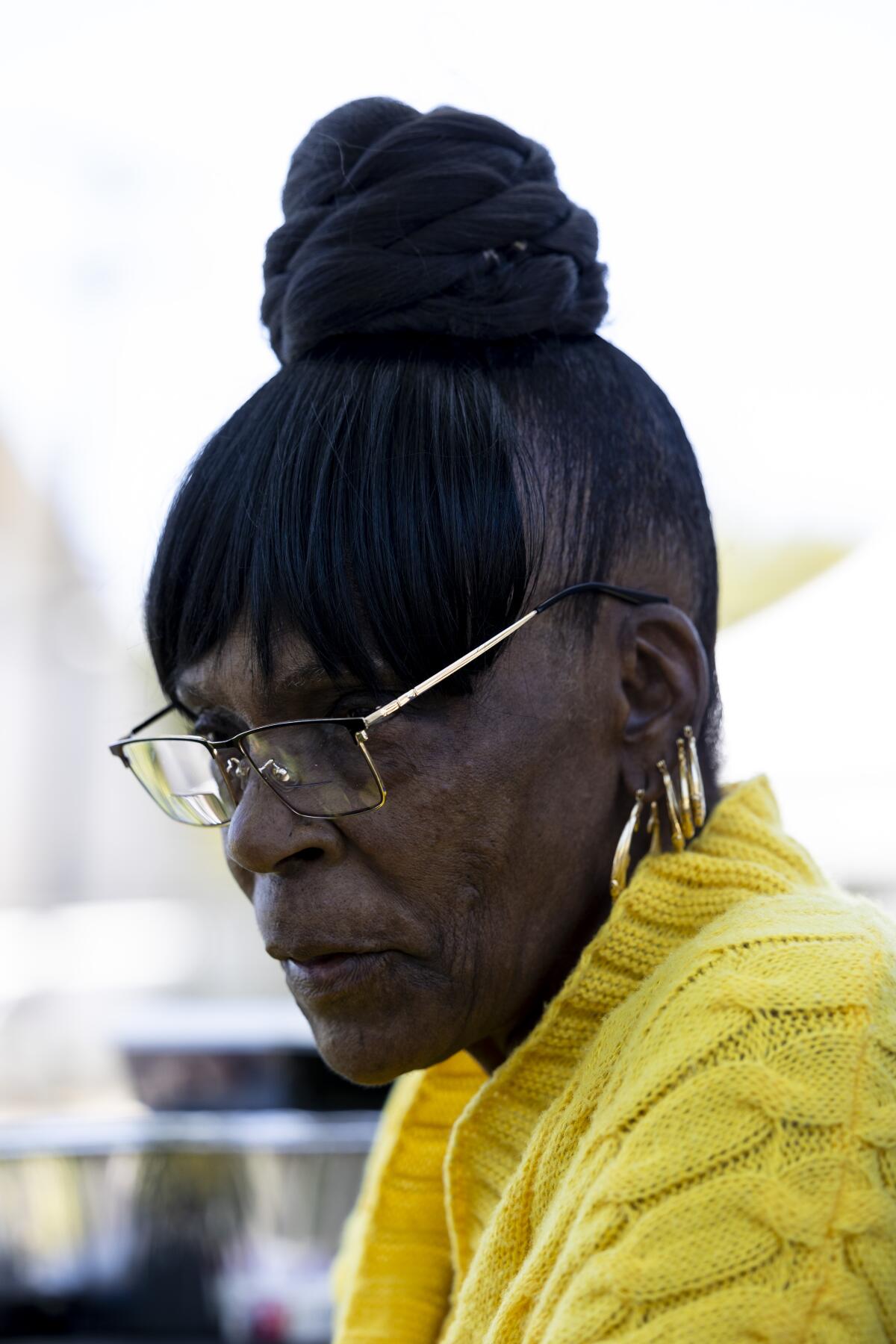
Geraldine Holloway, 67, said all of her best memories and loved ones are in Oakwood.
(Zoe Cranfill / Los Angeles Times)
“Every time somebody passed away, the kids sell the properties. But my family’s still here. I got a lot of family here in this park right now,” Holloway said, and she pointed to them one by one.
Clinton Noble is a case manager at Helper Foundation, a youth anti-violence nonprofit that helped found the holiday. He said the event was born out of a desire to remember friends and family who had passed on. Churches, community groups and private citizens funded the event in the past. Attendees would hang portraits of loved ones they had lost on the park’s chain link fences.
“We birthed the idea of remembrance. Whether you had lost somebody or were dealing with some kind of tragedy, we had a common goal to come out and celebrate,” Noble said.
But it wouldn’t be accurate to describe the holiday as a somber time. Whatever tragedy and regrets attendees might face, Hood Day is a full-throated celebration.
After the speeches concluded, attendees, including Nightingale, swarmed the dance floor and moved in unison through steps everyone knew by heart. Three cars full of hip-hop dancers dressed as clowns showed up and started krumping, a type of dance born in South Los Angeles. People passed each other plates with the properly sized proportions of their favorite foods.
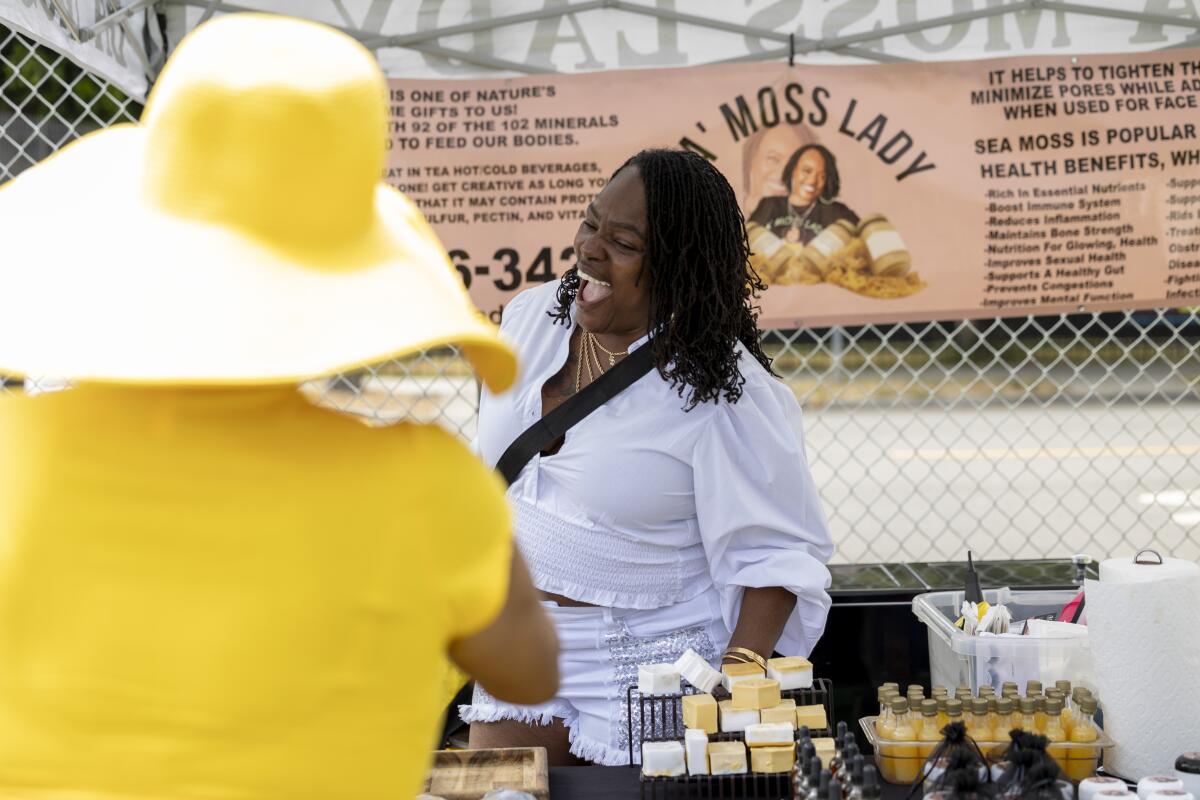
“Da’ Moss Lady” Gwendolyn Moseley, 60, talks to customers at her stand at the Oakwood Juneteenth celebration.
(Zoe Cranfill / Los Angeles Times)
The day was a powerful testament to the idea that home is more than a property, especially if you’re from a group that has been historically denied homeownership by racist real estate practices such as redlining and racially restrictive deed covenants.
Sometimes home is just a feeling you carry around with you, or a cooked meal, a familiar flavor.
Sometimes it’s a gathering once a year, a holiday hidden within a holiday, a time to share a secret feeling of intimacy with the people you grew up with, even if just for a few hours.
Source link













